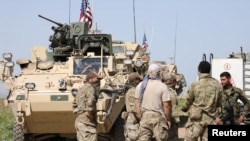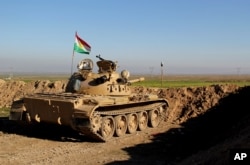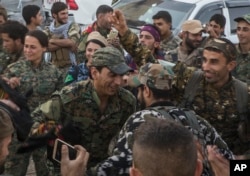The Kurds' involvement in the conflict in Syria is difficult to understand because of their own troubled history that spreads across several regional borders. Here is a look at the current Kurdish crisis and how it came to be:
Who are the Kurds?
The Kurds are one of the indigenous people of the Mesopotamian plains and the highlands, areas that today are contained within southeastern Turkey, northeastern Syria, northern Iraq, northwestern Iran and southwestern Armenia.
Estimated at between 25 million and 35 million people, the Kurds are the fourth-largest ethnic group in the Middle East. They form a distinctive community, united through race, culture and language, and while most of them are Sunni Muslims, they also adhere to a number of different religions and creeds.
They are considered the largest ethnic group in the world to be stateless.
Why don't they have a country?
After World War I and the defeat of the Ottoman Empire, the victorious Western allies made provision in the 1920 Treaty of Sevres for the formation of a Kurdish state, to be known as Kurdistan.
But their hopes were dashed three years later when the Treaty of Lausanne, which set the boundaries of modern Turkey, made no provision for a Kurdish state and left Kurds with minority status in their respective countries. Over the next 80 years, any move by Kurds to set up an independent state was brutally quashed.
The war against Islamic State has presented a huge opportunity for the Kurds to project legitimacy on the international stage.
What is their role in the war against Islamic State?
Kurds in both Iraq and Syria continue to be involved in the fight against the Islamic State group, but the battle is slowing down. Thousands of Kurds have been killed in battles that put a dent in IS's influence from its peak in 2014.
Their role in these battles has earned the Kurds a global reputation as the most effective ground forces against the terror group. The peshmerga, which also includes women, has shown to be an effective fighting force.
In September 2014, IS launched an assault on the enclave around the northern Syrian Kurdish town of Kobani, forcing tens of thousands of people to flee across the nearby Turkish border. In January 2015, after a battle that left at least 1,600 people dead, Kurdish forces regained control of Kobani.
Since then, the Kurds — fighting under the name of the Syrian Democratic Forces (SDF) alongside several local Arab militias, and helped by U.S.-led coalition airpower — have driven IS out of a large swath of territory in Syria and established control over a large area along the border with Turkey.
In October 2017, the SDF captured the de facto IS capital of Raqqa and were advancing southeast into the neighboring province of Deir el-Zour — the jihadists' last major foothold in Syria.
The U.S.-led coalition in early December 2018 sent military gear to the front line in eastern Syria as battles between the SDF and IS continues. With the news days later that the Trump administration is pulling all U.S. troops out of Syria "as quickly as possible," there are questions about the long-term implications for the country, the region and international relations.
Kurds vs. Turks vs. IS
American support for the SDF has strained relations with Turkey. Ankara has warned Washington about observation posts Washington has set up in northern Syria to prevent any altercations between Turkish forces and the U.S.-backed Syrian Kurdish People's Protection Units (YPG), which fights under the banner of SDF.
The YPG is considered a terrorist organization by Ankara. It is an offshoot of the outlawed Kurdistan Workers' Party (PKK), which has battled against the Turkish state since 1984.
The PKK is blacklisted as a terrorist group by the U.S. and European Union, while the YPG is not.
Turkey launched two military operations to help Syrian rebels recapture territory in Syria from IS and the YPG in August 2016 and January 2018.
The first offensive in northern Syria lasted until March 2017. The second wrapped up in March 2018 after Ankara-backed rebels captured the YPG-held enclave of Afrin in northwestern Syria.







